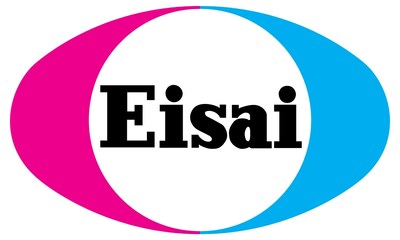Eisai Co., Ltd. (Headquarters: Tokyo, CEO: Haruo Naito, “Eisai”) announced today the company will present the latest findings on lecanemab (U.S. brand name: LEQEMBI®), Eisai’s anti-amyloid beta (Aβ) protofibril* antibody for the treatment of Alzheimer’s disease (AD), at the 2024 International Conference on Alzheimer’s and Parkinson’s Diseases and related neurological disorders (AD/PD™) from March 5-9 in Lisbon, Portugal, and virtually.
| TOKYO, Feb. 28, 2024 /PRNewswire/ -- Eisai Inc. (Headquarters: Tokyo, CEO: Haruo Naito, “Eisai”) announced today the company will present the latest findings on lecanemab (U.S. brand name: LEQEMBI®), Eisai’s anti-amyloid beta (Aβ) protofibril* antibody for the treatment of Alzheimer’s disease (AD), at the 2024 International Conference on Alzheimer’s and Parkinson’s Diseases and related neurological disorders (AD/PD™) from March 5-9 in Lisbon, Portugal, and virtually. The lecanemab data and additional research findings from Eisai’s AD portfolio will be featured in 18 presentations, including ten oral presentations. Eisai will present five oral presentations and one poster presentation on lecanemab results. From the Phase 3 Clarity AD study in subjects with mild cognitive impairment (MCI) due to Alzheimer’s disease (AD) and mild AD dementia (collectively known as early AD) with confirmed brain Aβ accumulation, presentations will include data on the effect of lecanemab treatment on tau accumulation in whole brain regions, and outcomes of long-term efficacy of lecanemab. In addition, the differences in the binding properties of multiple anti-amyloid (Aβ) antibodies to various types of Aβ and other data will be presented. Eisai will also host a symposium titled “Defining meaningful benefits to patients, caregivers, and healthcare systems in Alzheimer’s disease”. “Lecanemab treatment of early AD in the Phase 3 Clarity AD study had less clinical decline and slower tau accumulation than placebo,” said Michael Irizarry, M.D., Deputy Chief Clinical Officer and Senior Vice President of Clinical Research at Eisai Inc. “The earlier MCI due to AD and mild AD dementia are diagnosed and treated, the greater the opportunity for the patient to benefit. We will continue to share the importance of and rationale for early treatment with lecanemab to the scientific community.” Eisai Symposium – Defining meaningful benefits to patients, caregivers, and healthcare systems in Alzheimer’s disease. Eisai’s Chief Clinical Officer, Lynn Kramer, M.D., will give a plenary presentation as “Novel approaches to clinical development and the future potential of simulated placebo” on March 7 at the “Aβ TARGETING THERAPIES IN AD 1" session. AD/PD 2024 Presentations Relating to Eisai’s Key Compounds and Research Oral Presentations
Poster Presentations
Eisai-Sponsored Symposium
Plenary Presentation
Eisai serves as the lead of lecanemab development and regulatory submissions globally with both Eisai and Biogen co-commercializing and co-promoting the product and Eisai having final decision-making authority. * Protofibrils are large Aβ aggregated soluble species of 75-5000 Kd.1, 2,3 [Notes to editors] 1. About Lecanemab Please see full Prescribing Information. In Japan, Eisai received approval from the Ministry of Health, Labour and Welfare (MHLW) on September 25, 2023, to manufacture and market lecanemab as a treatment for slowing progression of mild cognitive impairment (MCI) and mild dementia due to AD. In China, Eisai received approval for the treatment of MCI due to AD and mild AD in January 2024 LEQEMBI’s approval was based on Phase 3 data from Eisai’s large, global Clarity AD clinical trial, in which LEQEMBI met its primary endpoint and all key secondary endpoints with statistically significant results and confirmed the clinical benefit of LEQEMBI.4,5 The primary endpoint was the global cognitive and functional scale, Clinical Dementia Rating Sum of Boxes (CDR-SB). In the Clarity AD clinical trial, treatment with LEQEMBI reduced clinical decline on CDR-SB by 27% at 18 months compared to placebo. In addition, the secondary endpoint from the AD Cooperative Study-Activities of Daily Living Scale for Mild Cognitive Impairment (ADCS MCI-ADL), which measures information provided by people caring for patients with AD, noted a statistically significant benefit of 37% compared to placebo. The ADCS MCI-ADL assesses the ability of patients to function independently, including being able to dress, feed themselves and participate in community activities. The most common adverse events (>10%) in the LEQEMBI group were infusion reactions, ARIA-H (combined cerebral microhemorrhages, cerebral macrohemorrhages, and superficial siderosis), ARIA-E (edema/effusion), headache, and fall. Eisai has also submitted applications for approval of lecanemab in 11 countries and regions, including EU, Canada and Great Britain. Eisai has completed a lecanemab subcutaneous bioavailability study, and subcutaneous dosing of lecanemab is currently being evaluated in the Clarity AD (Study 301) open-label extension (OLE). A maintenance dosing regimen has been evaluated as part of Study 201. Since July 2020 the Phase 3 clinical study (AHEAD 3-45) for individuals with preclinical AD, meaning they are clinically normal and have intermediate or elevated levels of amyloid in their brains, is ongoing. AHEAD 3-45 is conducted as a public-private partnership between the Alzheimer’s Clinical Trial Consortium that provides the infrastructure for academic clinical trials in AD and related dementias in the U.S, funded by the National Institute on Aging, part of the National Institutes of Health, Eisai and Biogen. Since January 2022, the Tau NexGen clinical study for Dominantly Inherited AD (DIAD), that is conducted by Dominantly Inherited Alzheimer Network Trials Unit (DIAN-TU), led by Washington University School of Medicine in St. Louis, is ongoing and includes lecanemab as the backbone anti-amyloid therapy. 2. About the Collaboration between Eisai and Biogen for AD 3. About the Collaboration between Eisai and BioArctic for AD References 1 https://www.alzforum.org/news/conference-coverage/lecanemab-sweeps-toxic-av-protofibrils-catches-eyes-trialists 2 Sehlin D, Englund H, Simu B, Karlsson M, Ingelsson M, Nikolajeff F, Lannfelt L, Pettersson FE. Large aggregates are the major soluble Aβ species in AD brain fractionated with density gradient ultracentrifugation. PLoS One. 2012;7(2):e32014 https://doi.org/10.1371/journal.pone.0032014 Epub 2012 Feb 15. PMID: 22355408; PMCID: PMC3280222. 3 Söderberg, L., Johannesson, M., Nygren, P. et al. Lecanemab, Aducanumab, and Gantenerumab — Binding Profiles to Different Forms of Amyloid-Beta Might Explain Efficacy and Side Effects in Clinical Trials for Alzheimer’s Disease. Neurotherapeutics (2022). https://doi.org/10.1007/s13311-022-01308-6. Accessed February 9, 2023. 4 Eisai presents full results of lecanemab Phase 3 confirmatory Clarity AD study for early Alzheimer’s disease at Clinical Trials on Alzheimer’s Disease (CTAD) conference. Available at: https://www.eisai.com/news/2022/news202285.html Last accessed: February 2024. 5 van Dyck. C, et al. Lecanemab in Early Alzheimer’s Disease. The New England Journal of Medicine. DOI: 10.1056/NEJMoa2212948. https://www.nejm.org/doi/full/10.1056/NEJMoa2212948
SOURCE Eisai Inc. | ||||||||||||||||||||||||||||||||||||||||||||||||||||||||





